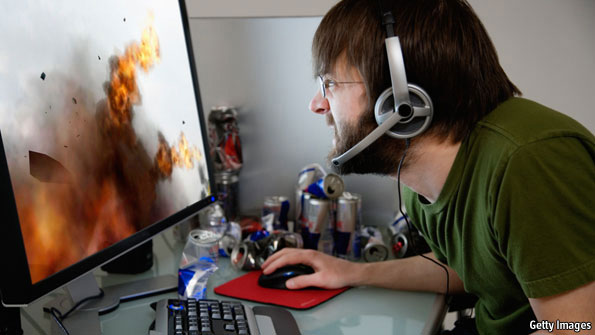On le savait déjà mais c'est toujours rigolo à lire:
C'est tiré du journal The Economist, un des meilleurs magasines/journaux du monde. c'est en anglais et j'ai pas le temps de vous le traduire (je suis en maths), mais jeudi, je serai en anglais et je tenterai de vous le faire....
à moins que les anglophones de la guilde le fassent à ma place...
en ultra condensé, les jeux vidéos amélioreraient la prise de décisions rapides et les analyses instantanées. le repérage dans l'espace et les réflèxes.
le journal titre sir wow maiss en fait, l'etude pourte visiblement sur des FPS (CoD4 et UT). a contrarion des jeux de gestions type "sims" n'apportent en fait rien du tout.
le journal conclut que c'est bien mais que c'est pas une raison de ne faire que ça

voici l'article:
Why World of Warcraft is good for you
Sep 13th 2010, 15:40 by N.L. | LONDON

VIDEO games have been blamed for the ills of the world. Parents worry that violent games make their children antisocial, violent, shallow, and obese, and are breeding a generation that cannot sustain their concentration. Screen time is routinely limited, much to the chagrin of their keyboard-pounding offspring.Help is at hand in the form of a new study from cognitive scientists at the University of Rochester. As
we report in this week's issue of
The Economist, this suggests that video gamers make faster and more accurate decisions. The work is published in
Current Biology. What was particularly interesting was that the faster reaction times of the video gamers could be acquired by non-video gamers in 50 hours of training over a few weeks. But for the benefits to accrue, they had to play a particular sort of game. Only those who played fast-moving action video games such as "Call of Duty 2" and "Unreal Tournament" saw an improvement in their decision-making skills. Rather ironically, players of "The Sims 2", a game where one has to decide how to organise an entire simulated world, did not benefit this way. Those trained with action video-games were 25% faster at coming to a conclusion, and answered just as many questions correctly.
The scientists conclude that video-game players develop an enhanced sensitivity to what is going on around them, and this may help with activities such as multitasking, driving, reading small print, navigation and keeping track of friends or children in a crowd. The precise neural mechanism for this effect is still unknown. What is known, however, is that people make decisions based on probabilities, which are constantly being calculated and refined in their heads—something called “probabilistic inference”. The brain collects small pieces of information, eventually gathering enough to make an accurate decision. When driving a car, for example, these many probabilities will be collated to make decisions such as whether or not to brake. The more efficient one is at collecting visual and auditory information, the faster a person can reach the threshold needed to make a decision.
Of course, parents can take heart from the fact that while the study does suggest some benefit in action video games, it does not imply that one must do nothing else. Nor, indeed, does the study compare the benefits of training on action video games with those of other activities that involve switching off the computer and getting a life.
